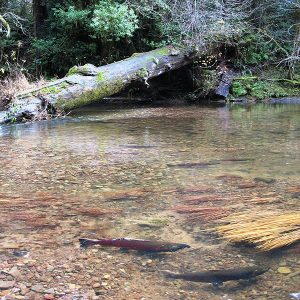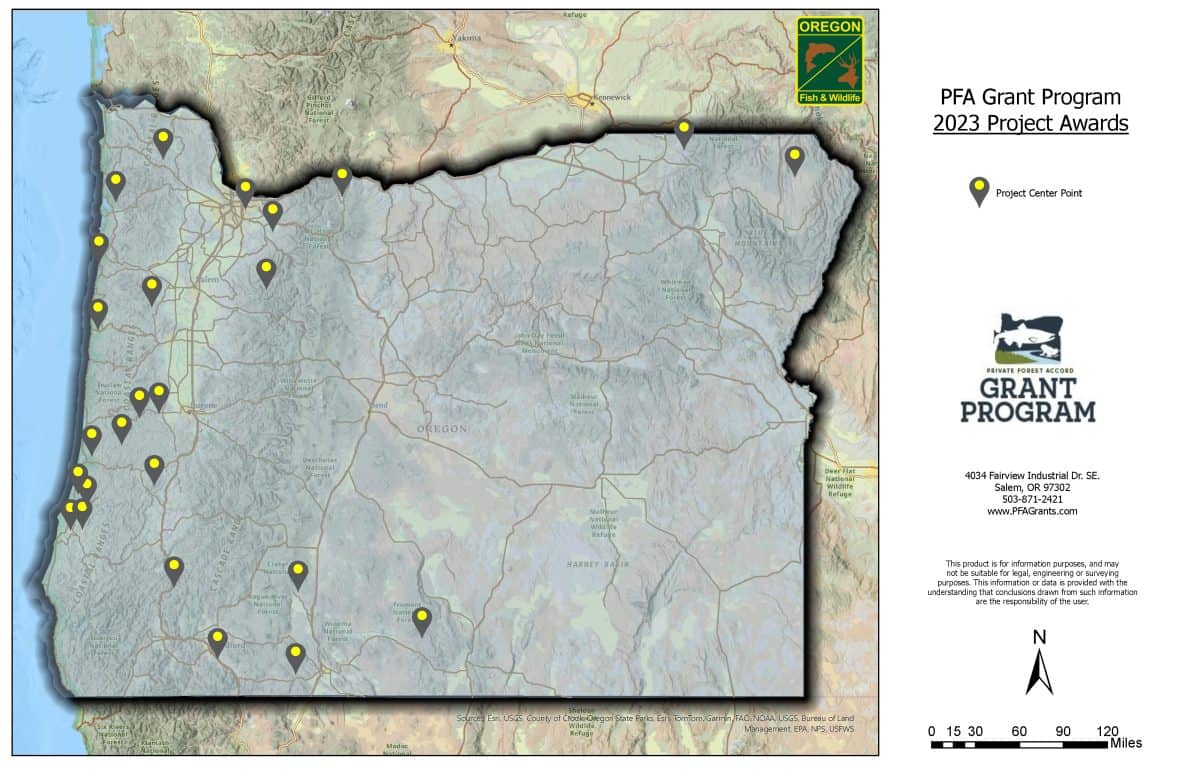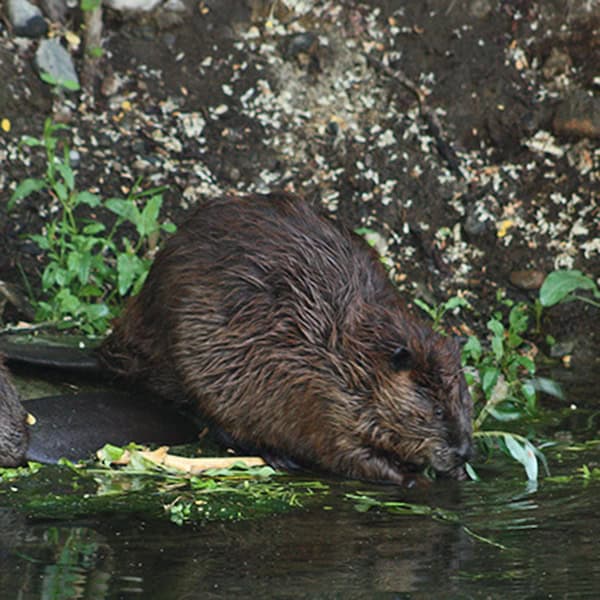(May 2, 2024- SALEM, Ore.) The PFA Grant Program, administered by ODFW, funded its first-ever round of habitat restoration projects awarding more than $10 million to 25 projects throughout Oregon.
This year’s PFA grant funding prioritized projects that improve stream and wetland conditions for fish and wildlife. The projects will restore critical spawning grounds, fish passage, and other important aquatic habitats for fish and wildlife with a focus on the recovery of native salmon, trout and select amphibians. They will also improve water quality, remove invasive species, and restore native plant communities.
These carefully selected projects represent a strategic investment in Oregon’s aquatic habitats and align with the PFA Grant Program’s conservation goals.
“This is a good day for all Oregonians,” said Chad Washington, Chair of the PFA Grant Advisory Committee. “The projects to be funded represent the culmination of many volunteer hours by the PFA Grant Advisory Committee working with state and federal agencies and other partners. They demonstrate the conservation benefit that can be achieved by focusing on shared goals and objectives.”
One of the projects, located in Umatilla County, will support efforts in the North Fork Walla Walla River to improve fish habitat across a 5.2-mile stretch of the river. This project with the Walla Walla Basin Watershed Council will restore the river’s natural features, like pools, meanders, and woody debris, making it a healthier home for many fish species, including steelhead, redband trout, bull trout, Chinook salmon, and mountain whitefish.
In Douglas County, funding was awarded to the South Umpqua Rural Community Partnership to restore 17 miles of critical spawning and rearing habitat for coho salmon in the Cow Creek watershed. By improving fish passage, the project will benefit salmon migration and overall water quality for coho and Chinook salmon, cutthroat trout, and giant salamanders.
“These PFA grants demonstrate the important strides Oregonians can make in our efforts to recover and sustain sensitive species by working collaboratively and finding common ground,” said Chrysten Rivard, Vice-chair of the PFA Grant Advisory Committee.
The Private Forest Accord Grant Program was established in the 2022 Legislative Session as an outcome of the landmark agreement between timber and conservation groups to recommend changes to the Forest Practices Act. The PFA Grant Program’s purpose is to fund projects that benefit aquatic species and habitats that may be affected by ongoing forest practices on private lands.
PFA grant funds come from the state’s General Fund and timber harvest tax revenues. For most projects, these funds are then matched with funds from partners like nonprofits, Watershed Councils, Soil and Water Conservation Districts, and Tribes.
“This $10 million investment is a critical step forward in conserving our state’s fish and wildlife resources,” said Sarah Reif, ODFW Habitat Division Administrator. “By supporting these diverse conservation projects, we ensure a healthy environment for these species and for generations to come.”
In Tillamook County, the grant will fund a fish passage project – replacing a culvert with a bridge – on Myrtle Creek.
 The project will increase recruitment into populations of Oregon’s native coastal fish species including Coho Salmon, Chum Salmon, Winter Steelhead, Chinook Salmon, and Sea-run Cutthroat Trout. We seek to increase spawner escapement and juvenile access to quality habitat upstream in 1.6 miles of Myrtle Creek. The Salmon Super Highway proposes construction of a 42-foot bridge to replace the deteriorating, perched, and undersized culvert that creates a fish passage barrier at Kilchis River Road.
The project will increase recruitment into populations of Oregon’s native coastal fish species including Coho Salmon, Chum Salmon, Winter Steelhead, Chinook Salmon, and Sea-run Cutthroat Trout. We seek to increase spawner escapement and juvenile access to quality habitat upstream in 1.6 miles of Myrtle Creek. The Salmon Super Highway proposes construction of a 42-foot bridge to replace the deteriorating, perched, and undersized culvert that creates a fish passage barrier at Kilchis River Road.
Habitat Conservation Plan Covered Species: Native salmon and trout (Oncorhynchus spp.)
Funding Awarded:$755,128.77
Grantee Name:Trout Unlimited/Salmon Super Highway
The proposed fish passage project is located at the road/stream crossing of Kilchis River Road and Myrtle Creek in Tillamook , Oregon. The crossing is located approximately 600 feet upstream of Myrtle Creek’s confluence with the Kilchis River. An existing 41-foot-long, 5.5-foot diameter culvert is undersized, and its outlet is perched approximately four feet above the downstream water surface elevation. As a result, it adversely affects aquatic organism passage, impeding adult and juvenile salmonid access to approximately 1.6 miles of upstream habitat as well as hampering both the natural stream processes and the stream’s ability to transport organic matter. The Kilchis River basin historically supports Oregon Coast Coho (OCC) Salmon (ESA listed as threatened), Pacific Coast Chum Salmon, Oregon Coast Winter Steelhead, Pacific and/or Brook Lamprey, Oregon Coast Chinook Salmon, and Sea-run Cutthroat Trout. This project has the potential to increase habitat connectivity for these anadromous fish and restore access to historical spawning and rearing habitat. In addition, the culvert contributes to downstream fine sediment loading and requires an inordinate level of inspection and maintenance to avoid plugging and breaching. The proposed project will finalize project permitting, remove the existing culvert, and construct a 42-foot-long concrete bridge. To ensure project stability and long-term fish passage, the project also will construct approximately 280 feet of roughened stream channel (with boulders, large wood, and resting pools). The project will employ a staged construction method to provide continuous ingress and egress for residences and businesses beyond the crossing. Project partners include Tillamook Public Works, US Fish and Wildlife Service, Oregon Department of Fish and Wildlife, and Tillamook Estuaries Partnership.

The inaugural awards for the PFA Grant Program funded 25 projects totaling $10,009,898.37 which benefit aquatic species and habitats across Oregon. Visit the PFA Grants website at PFAGrants.com or click here to view a list of recently funded projects.
The next opportunity to apply for a PFA grant is planned for Fall 2024 and will award millions more in funding.


